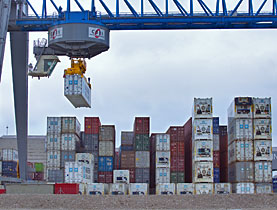Swiss economy “can weather credit crisis”

The Swiss economy can ride out market turbulence to post gross domestic product (GDP) growth of up to 1.7 per cent next year, the main business lobby group believes.
But the Swiss Business Federation, economiesuisse, has repeated calls for economic reforms, in particular a reduction of tax on share dividends, to improve Switzerland’s competitiveness.
Announcing its 2008 forecast in Zurich on Friday, economiesuisse said strong exports and consumer spending would drive economic growth to 2.7 per cent by the end of the year – well above the European average.
It predicted a slow-down to between 1.5-1.7 per cent next year as a result of declining international growth, sparked by problems in the United States real estate sector.
Many banks, including the Swiss leader UBS, have had their fingers burned by investing heavily in the declining US subprime housing market that lends to people with poor credit ratings. It is feared that credit could dry up as a result of mounting bad debts in the financial markets.
Federation chief economist Rudolph Minsch acknowledged that the full extent of the problem might not yet be known. But he believes the world’s financial markets should be able to absorb the current worst-case loss estimates of $300 billion (SFr340 billion).
No repeat of 1990s
Swiss financial institutions as a whole have escaped relatively unscathed because of their dominance in the booming wealth management sector, Minsch said. Substantial gains made there have outweighed US investment losses, apart from the recent case of UBS.
“What is relevant to Swiss GDP is the wealth created in Switzerland not the losses in the US. So there is no huge problem for the growth rate in Switzerland,” Minsch told swissinfo. “All the wealth based in Switzerland is stable and the risk managers have done a good job.”
Minsch added that the Swiss credit crisis between 1991 and 1996 that cost banks SFr42 billion ($37 billion) may have been caused by the same over-aggressive selling of mortgages, but the latest problem is diluted because it was not created in Switzerland.
“The credit crisis in Switzerland was a totally national problem and this financial crisis is a global phenomenon due to new financial products sold all around the world,” he said.
Economiesuisse president Gerold Bührer said Switzerland should not rest on its laurels. He repeated calls for six changes: tax reforms, a brake on national debt, more bilateral agreements, reform of the internal market, improved education and research and energy reforms.
State intervention
The call for reform was echoed by a report by Switzerland’s second largest bank, Credit Suisse, last month calling for a restriction on public spending (that rose five per cent between 1990-2005) and economic liberalisation.
The report, however, sounded a warning about the extent of government intervention that could be harmful if taken to excess.
Economiesuisse has repeatedly called for liberalisation of the postal service and the energy market, but Credit Suisse cautioned that such moves would have to be handled carefully – citing the botched privatisation of Britain’s rail network in the 1990s.
swissinfo, Matthew Allen in Zurich
Economiesuisse said prices would rise 0.7% in Switzerland this year, compared with an inflation rate of 2.7% in the US and 2% in Europe.
The federation predicts Swiss inflation to rise to between 1.3-1.5% next year.
It also expects unemployment to fall slightly to 2.6% in 2008.
The federation’s prediction of a 1.5-1.7% Swiss GDP growth next year compares with an International Monetary Fund (IMF) prognosis of 4.8% world-wide, 1.9% in the US, 2.5% in Europe, 1.7% in Japan and 10% in China.
Swiss exports soared by 12.4% to SFr146 billion ($125 billion) in the first nine months of this year compared with 2006. Imports rose by 11.9% to SFr133.5 billion on the back of a healthy economy and weak Swiss franc – a trade surplus of more than SFr10 billion (20% higher than last year).
The main export destinations were emerging countries (+23.4%) and the EU (+13.1%), compared with (+4.2%) for industrial countries such as the US, Canada and Japan.
The State Secretariat for Economic Affairs (Seco) predicts Swiss GDP to grow 2.3% this year and 1.9% in 2008. The Swiss National Bank predicts growth of 2.5% (2007); 2% (2008), KOF Swiss Economic Institute: 2.8% (2007); 1.9% (2008); 2.0% (2009) and BAK Basel Economics: 2.7% (2007); 2.3% (2008).

In compliance with the JTI standards
More: SWI swissinfo.ch certified by the Journalism Trust Initiative











You can find an overview of ongoing debates with our journalists here . Please join us!
If you want to start a conversation about a topic raised in this article or want to report factual errors, email us at english@swissinfo.ch.